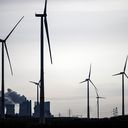UN climate panel calls for historic shift to renewable energy

A major new report from the UN Intergovernmental Panel on Climate Change calls for an urgent shift away from fossil fuels toward renewable energy technologies in order to rein in global warming.
Why it matters: The IPCC's assessment reports set the terms of the climate debate with world leaders, CEOs and activists. A 2018 report galvanized a global youth protest movement.
The report, the third and final chapter in a broader assessment of climate science, focuses on what can be done to limit climate change.
- It concludes that the chances of meeting the most aggressive Paris Agreement temperature target — 1.5°C of warming above preindustrial levels — is slipping out of reach.
- The report includes a lengthy section on the role for carbon removal technologies, saying they are "unavoidable" in order to achieve net zero emissions.
- However, the authors place greater emphasis on the need to reduce emissions as much as possible in industry, transportation, land use and other sectors.
- The report reserves carbon removal for sectors such as certain industrial processes that are especially difficult to move away from fossil fuels.
By the numbers: The report calls for global greenhouse gas emissions to peak by 2025, and effectively rules out the possibility of limiting warming to 1.5 degrees without at least temporarily shooting past that temperature target.
- The IPCC has shown that potentially catastrophic impacts of global warming, such as the loss of warm water coral reefs, are far more likely to occur if warming exceeds the 1.5-degree guard rail.
The big picture: The report highlights that, during the last decade, average annual greenhouse gas emissions were at their highest levels in human history.
- The report finds that if global carbon dioxide emissions continue at current rates, the remaining "carbon budget" for keeping warming to the Paris Agreement's target "will be exhausted before 2030."
- Without the enactment of more stringent emissions reduction policies, the world is headed for median global warming of 3.2°C (5.76°F) by 2100, the report states.
- This much warming would have severe consequences for people and ecosystems, potentially destabilizing large parts of the Antarctic and Greenland ice sheets, and even rendering parts of the globe unlivable for parts of each year due to extreme heat.
To lower emissions, the IPCC points to the increasing affordability of renewable energy technologies, noting the decreases of up to 85% in the costs of solar, wind and batteries since 2010.
- And in a departure from the last IPCC assessment report in 2014, it paints a darker future for the future use of fossil fuels.
- The report finds far greater investments are needed to scale up renewable energy technologies, with current investments falling short by three to six times compared to what is needed to limit warming to below 2°C by 2100.
- The report also finds that lifestyle changes, if paired with sweeping policy changes in transport, buildings and other sectors, could result in significant emissions reductions by 2050. However, individual lifestyle changes alone are insufficient to curtail climate change.
The intrigue: According to the IPCC, limiting warming to 2°C or below, as called for under the Paris Agreement, will effectively render fossil fuel assets, such as untapped reserves and power plants already in use, unusable. These facilities would then be known as "stranded assets."
- The report warns that coal — the most carbon intensive energy source — is the most vulnerable to becoming stranded assets during the coming decade, with oil and gas infrastructure increasingly rendered unusable toward midcentury.
- About 30% of oil, 50% of gas, and 80% of coal reserves would be unusable if warming is to be limited to the Paris Agreement's 2°C target, the report states.
What they're saying: The report underscores the urgency of cutting emissions at a time when boosting fossil fuel production is on the agenda, due to Russia's war in Ukraine.
- "Climate activists are sometimes depicted as dangerous radicals," said UN Secretary-General António Guterres, in a statement. "But the truly dangerous radicals are the countries that are increasing the production of fossil fuels."
Go deeper: Behind the curtain of the UN's climate panel